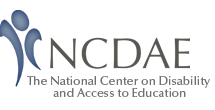NCDAE Accessibility Newsletter - January 2006
In this Edition:
- Feature Article - Education Technology Plans and Disability Access
- Tips and Tools - Microsoft PowerPoint
- Factoid
- Upcoming Event - Accessible Distance Education National Discussion
- Affiliate Corner - Pat Brown
- In The News - The Changing Role of Libraries in a Digital World
Featured Article
Education Technology Plans and Disability Access
The National Center on Disability and Access to Education (NCDAE) recently teamed with the National Center on Accessible Information Technology in Education (AccessIT), at the University of Washington, to review state and local education technology plans throughout the country. Our goal was to determine the level of attention given to students with disabilities who access electronic educational materials and activities. The following statement from a local school district in Colorado is indicative of what was found. The "plan provides for meaningful access by all students and educators, regardless of disability, economic status, or other special needs." Other than this brief mention of students with disabilities, there is nothing specific to ensuring that the needs of these students are met. In another example, the State of New York's education technology plan indicates that, "New York state learning standards will incorporate standards for technology literacy to ensure that every student, regardless of the student's race, ethnicity, gender, family income, geographic location, or disability will be technologically literate by the time he/she graduates from high school, including the skills needed for success in their future study and employment."
While unfortunate, this lack of attention to the unique needs of students with disabilities is not unexpected. The most recent National Education Technology Plan released nearly one year ago suffers from the same lack of specificity. When the National plan was released, NCDAE indicated, "There is no mention of universal design or assistive technology. It is tragic that so much energy and effort was placed on developing a plan that does not appear to include everybody." The U.S. Department of Education responded to this concern by indicating that when the plan refers to all children, it means all, including students with disabilities. Given what we know about students with disabilities, addressing their unique needs is essential. Sarah Rule, director of NCDAE recently stated, "We must be sure that the unique needs of these students are considered when developing technology infrastructure and education, including the development of curriculum and teacher training."
As NCDAE and AccessIT continue to review state education technology plans, we look forward to finding exemplary education technology plans at the state or local district level. If you are aware of exemplary plans, please contact NCDAE at www.ncdae.org/community/contact.php or contact Marty Blair (NCDAE) at 435-797-3886 or Pat Brown (AccessIT) at 206-616-2223.
Tips and Tools
Microsoft PowerPoint
PowerPoint is the most commonly used presentation software. Unfortunately, most PowerPoint presentations are not totally accessible to people with disabilities. NCDAE has created a fact sheet that is designed to help you understand the accessibility features and challenges of PowerPoint. It addresses how to increase the native accessibility of a PowerPoint presentation and how to create an accessible HTML version of a PowerPoint file. We hope that you will not only read this fact sheet, but add your comments and experiences so we can continually expand this resource.
For more information visit: http://ncdae.org/tools/factsheets/powerpoint.php
Factoid
Online news magazine Outlaw.com reports a recent survey conducted by British Usability and Accessibility consulting firm, User Vision. They polled 208 internet users with disabilities to discover what usability issues are most important to them. Here are the top five most useful features and annoyances from that survey:
Useful Features
- Having in-site search
- Having a sitemap
- Clear, well labeled links
- Having internal page navigation
- Ability to personalize page view/font size
Annoyances
- Not having in-site search
- No sitemap
- No internal page navigation/skip to content/back to top links
- Pop-ups
- Inability to change font size/colour contrast
To read the full article visit: http://www.out-law.com/default.aspx?page=6314
Upcoming Event
Accessible Distance Education National Discussion
NCDAE and AccessIT are co-sponsoring a National Discussion on Accessible Distance Education and IT on Wednesday, January 18, 2006 immediately prior to the ATIA 2006 Conference. NCDAE affiliates and partners are invited to attend the discussion from Noon to 4:00PM. The no-host lunch and meeting will build on the national discussion held November 18, 2005 in Washington, DC. Participants in that meeting identified a series of initiatives and activities to enhance accessible education-related information technology in the public school setting. Register now to participate in this hands-on national discussion .
An audio archive and transcript of Carol Leffler's presentation from the November 18, 2005 meeting is available on the NCDAE website. Workgroup notes will be available soon.
Affiliate Corner
 Affiliate Highlight - Pat Brown
Affiliate Highlight - Pat Brown
Hi, my name is Pat Brown. I am a Clinical Assistant Professor in the Department of Rehabilitation Medicine at the University of Washington (UW). I also direct the UW Employment Training Program and I am Assistant Director of the Center for Technology and Disability Studies (UWCTDS). UWCTDS is directed by Kurt Johnson and houses several research, training and direct service grants including the Washington Assistive Technology Alliance (WATA), the National Center on Accessible Information Technology in Education (AccessIT) and Project ACCESS (Assisted Cognition in Community, Employment and Support Settings).
My research interests include issues in the employment of persons with cognitive disabilities, disability policy, technology and disability, and adolescent transition from school to employment. My research and teaching has given me the opportunity to work with many wonderful colleagues within the university and across the country.
Through my work with AccessIT, I have had the opportunity to work with Marty Blair and Stephanie Holt (both of NCDAE) to identify exemplary accessible IT policies in
K-12 school districts and to participate in jointly sponsored forums (NCTI and ATIA) and webcasts. I am also currently working with Deborah Buck (ATAP) to identify exemplary postsecondary accessible IT policies.
In the News...
The Changing Role of Libraries in a Digital World
E-Books, Book Scanning and Digital Libraries are fast becoming a part of the educational landscape. Digital materials can be a boon for students with disabilities, allowing them to access materials in a format that best suits their needs. However, the digitizing of books and materials has caused both controversy and competition. Google's plan to scan millions of books has incited fear from publishers and spurred competitors such as MSN, Amazon, and Yahoo to join the scanning revolution. How will this revolution change libraries (and librarians) as we know them? The following are just a sampling of recent articles from our RSS feed:
World Digital Library Planned
http://www.washingtonpost.com/wp-dyn/content/article/2005/11/21/AR2005112101428.html
Microsoft to Scan Brit Books
http://www.internetnews.com/ent-news/article.php/3562056
Alliance Aims To Digitize Classic Books
http://seattletimes.nwsource.com/html/businesstechnology/2002579521_btscanning24.html
Yahoo Works With 2 Academic Libraries and Other Archives on Project to Digitize Collections
http://chronicle.com/free/2005/10/2005100301t.htm
Digital Libraries: 'Opening' A Digital Library
http://www.campus-technology.com/article.asp?id=11727
Libraries Offering Audiobook Downloads
http://www.technologyreview.com/articles/05/08/ap/ap_082905.asp
Academic Libraries Empty Stacks For Online Centers
http://www.csmonitor.com/2005/0823/p01s05-legn.html
Living Book Makes Learning Easier
http://istresults.cordis.lu/index.php/section/news/BrowsingType/Long%20Feature/Tpl/article/ID/77881
Publishing Makes Shift To Digital
http://news.bbc.co.uk/2/hi/technology/4633423.stm
Electronic Full-Text Journal Articles: Convenience or Compromise
http://www.thejournal.com/magazine/vault/A5364.php
The Business of Life: E-Learning Threatens Publishers
http://abcnews.go.com/Business/story?id=769166&
Libraries Cut Many Print Publications
http://www.dailybruin.ucla.edu/news/articles.asp?id=33208

